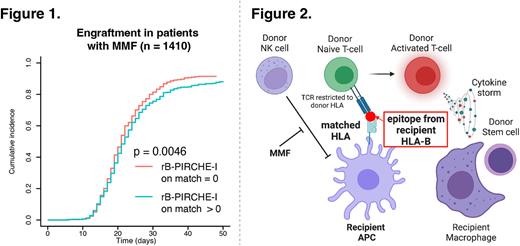Abstract
Backgrounds Despite cord blood is an important alternative stem cell source for the patients without HLA matched donors, engraftment failure is the most significant obstacle in cord blood transplantation (CBT). Donor-specific anti-HLA antibody and hemophagocytic syndrome (HPS) after severe pre-engraftment immune reaction are the major causes of engraftment failure. However, the allo-immunity associated with graft rejection has not been fully understood.
In HLA-mismatched transplantation, mismatched HLA is an important target for allo-immunity but the immunogenicity is different depending on the mismatched HLA pair of donor and recipient. Therefore, we hypothesized that by evaluating the antigenicity of mismatched HLA, we could improve donor selection criteria for CBT.
Methods: We performed a retrospective analysis of clinical data on 4,100 single-unit CBT in Japan between 2001 and 2017 deposited in Transplant Registry Unified Management Program (TRUMP). Using the PIRCHE algorithm (PIRCHE AG, Berlin), the number of mismatched HLA-derived epitopes to be presented by HLA was predicted. PIRCHE was quantified separately for the mismatched recipient loci (HLA-A, -B, -C, -DRB1) and the presenting donor-HLA (ClassI or ClassII, matched or mismatched HLA). Specifically, we evaluated binding affinities of peptides that could be made from recipient mismatched HLA to donor HLA using netMHCpan and netMHCIIpan. Epitopes with IC50 < 500 nM for Class I and < 1000 nM for Class II were defined as PIRCHE-I and PIRCHE-II, respectively.
Results: The death-censored median observation period was 2.7 years (0.5-17.1), median age at transplantation was 53 years (16-75), and 96.4% of patients were infused with HLA-mismatched cord blood. The present cohort includes patients with AML (49.6%), ALL (14.0%), Lymphoma (12.9%), MDS (10.8%), CML (2.2%), and other diseases (10.5%). Full-intensity conditioning was performed in 50.4% of patients. All patients received calcineurin inhibitors (CNI) for graft-versus-host disease (GvHD) prophylaxis, 1410 (34.5%) of them received MMF and 2110 (51.5%) received MTX in combination with CNI. The number of PIRCHEs derived from each HLA-loci showed zero-inflated distributions.
Patients with PIRCHE-I derived from recipient mismatched HLA-B (rB-PIRCHE-I) had a higher non-relapse mortality (NRM, Hazard ratio [HR] = 1.19, p = 0.004) and lower progression free survival (PFS, HR = 1.12, p = 0.002). They tended to have higher risk for engraftment failure and infection was leading cause of death. rB-PIRCHE-I was not associated with incidence of acute and chronic GvHD. Interestingly, rB-PIRCHE-I on matched HLA (rB-PIRCHE-I on match) was significantly associated with prognosis (PFS, HR = 1.11, p = 0.005), but those presented on mismatched HLA were not (PFS, HR = 1.07, p = 0.1). The numbers of infused nucleated cells and CD34+ cells in the graft were higher in the patients with rB-PIRCHE-I on match, but there was no difference in other patient backgrounds with or without rB-PIRCHE-I on match. In patients transplanted with HLA-B mismatched cord blood, rB-PIRCHE-I on match was prognostic.
In patients who received MMF, rB-PIRCHE-I on match was associated with engraftment failure (Figure 1) and poor prognosis (NRM, HR = 1.48, p < 0.001; PFS, HR = 1.26, p < 0.001), whereas there was no prognostic impact in the patients with MTX.
In order to elucidate the mechanism by which rB-PIRCHE-I increases engraftment failure in patients with MMF, we performed a detailed analysis of 100 patients who underwent CBT with MMF in the cohort of Kyushu University Hospital. As a result, we found that the frequency of HPS was significantly higher in patients with rB-PIRCHE-I on match (HR = 5.75, p = 0.001)
Discussion: In the early period after CBT, donor antigen-presenting cells (APCs) are not reconstituted and donor T-cell is restricted to donor HLA. Therefore, we speculate that recipient APCs are inducing severe allo-immune reaction by presenting rB-PIRCHE-I on matched HLAs which are recognizable to donor T-cells. Furthermore, NK cells in the graft have been reported to prevent GvHD via suppression of recipient APCs, and MMF has the ability to suppress NK cells; it is possible that MMF enhanced the allo-immune response induced by recipient APCs. (Figure 2)
Conclusion: HLA-mismatched cord blood without rB-PIRCHE-I is more desirable as a donor; when selecting a donor with rB-PIRCHE-I, it may be better to use MTX instead of MMF.
Disclosures
Niemann:PIRCHE AG: Current Employment. Spierings:UMC Utrech: Patents & Royalties: filed a patent application on the prediction of an alloimmune response against mismatched HLA. Kanda:asclepia: Honoraria; ASAHI KASEI PHARMA CORPORATION: Honoraria; Janssen Pharmaceutical K.K.: Honoraria, Membership on an entity's Board of Directors or advisory committees; Bristol-Myers Squibb Co: Honoraria; Novartis Pharma K.K.: Honoraria, Membership on an entity's Board of Directors or advisory committees; TEIJIN PHARMA LIMITED.: Honoraria; CHUGAI PHARMACEUTICAL Co., Ltd.: Honoraria; Takeda Pharmaceutical Company Limited: Honoraria; Sumitomo Dainippon Pharma Co., Ltd.: Honoraria; DAIICHI SANKYO Co., Ltd.: Honoraria, Membership on an entity's Board of Directors or advisory committees; SymBio Pharmaceuticals, Ltd.: Membership on an entity's Board of Directors or advisory committees; Sanofi K.K.: Honoraria; Kyowa Kirin Co., Ltd.: Honoraria; Megakaryon Co: Honoraria, Membership on an entity's Board of Directors or advisory committees; Janssen Pharmaceutical K.K.: Honoraria; Ono Pharma Inc.: Honoraria; Otsuka Pharmaceutical Co., Ltd.: Honoraria; Amgen Pharma Inc.: Honoraria; AbbVie Inc.: Honoraria, Membership on an entity's Board of Directors or advisory committees; Astellas Pharma Inc.: Consultancy, Honoraria; MSD K.K.: Honoraria; CSL Behring K.K.: Honoraria; Otsuka Pharmaceutical Co., Ltd.: Honoraria; NIPPON KAYAKU CO.,LTD.: Honoraria; Nippon Shinyaku Co., Ltd.: Honoraria; Eisai: Research Funding. Atsuta:Meiji Seika Pharma Co, Ltd.: Honoraria; Astellas Pharma Inc.: Honoraria; AbbVie GK: Honoraria; Mochida Pharmaceutical Co., Ltd.: Honoraria; Novartis Pharma KK: Honoraria; Kyowa Kirin Co., Ltd: Honoraria. Morishima:Pfizer: Honoraria; Janssen: Honoraria; Abbvie: Honoraria; Nippon Shinyaku: Honoraria; Bayer: Honoraria; Chugai Pharma: Honoraria; Sanofi: Honoraria; Kyowa Kirin: Honoraria; Takeda: Honoraria; Daiichi Sankyo: Honoraria; Meiji Seika: Honoraria.
Author notes
Asterisk with author names denotes non-ASH members.


This feature is available to Subscribers Only
Sign In or Create an Account Close Modal